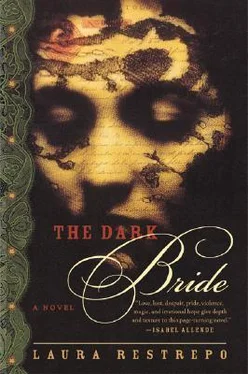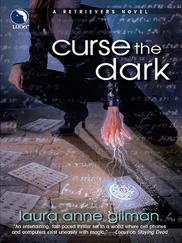“Madrina,” she said, pushing forward the small replica of herself, “this is my younger sister, Ana. I have come to ask if she can live here with us.”
On three other occasions over the course of the following year in similarly mysterious circumstances, Sayonara disappeared and reappeared without advising anyone of her intentions or telling anyone where she had gone, and always with identical results, and those three new opportunities also had their own names: Susana, Juana, and Chuza. So that by December the house was full and all five sisters were present, as Sayonara swore to Todos los Santos, promising her that she wouldn’t be bringing any more. Sayonara was the eldest, then Ana, Susana, Juana, and finally Chuza, a very tiny, very dark little child with shining eyes, hair to her waist, and the reflexes of a lizard, who didn’t speak Spanish or any other language and measured no more than twenty inches in height.
All five were installed full time and for life in Todos los Santos’s house, all five having appeared out of nowhere, all swarthy, short-statured, and long-haired, one behind the other like those lacquered wooden dolls from Russia that you keep opening and inside you find another identical but smaller, and another and still another, in a descending line until you reach the tiniest, which in this case was little Chuza.
When she learned of sweet Claire’s fierce death, a shadow, like a dead bird, fell across Sayonara’s gaze and her expression froze into a mask, as if she had been told of a shame that was too much her own, that in some unsuspected way had something to do with her.
“My mother and my brother committed suicide,” she said suddenly, five or six days later, making those who heard her shudder. “Until then my pueblo had known nothing about suicide; it had never occurred to a single one of those people to die that way. And suddenly two happened one after the other, with only a few hours between them, and both in my family.”
After a period of silence she added: “I loved my brother very much.”
Todos los Santos asked nothing, and she tells me that she had several reasons for doing so. First, because there is pain that doesn’t allow questions or offer any answers. Second, to respect the memories of others, which are sacrosanct and private, and to avoid probing into the hidden story that had always been guessed at yet still eluded them, as if calling attention to it was a way of invoking it. And because of jealousy, I would add: I don’t think that she wanted to admit the existence of another family and other love, different from her own, in Sayonara’s life.
“I hadn’t even been born when my mother died.” The girl didn’t make it any easier to find out much about her life, given her penchant for dropping false clues.
So the adopted mother didn’t say anything to her adopted daughter but secretly began to watch Sayonara’s every step, especially in the shifting hours between night and dawn, and if she saw the girl heading in the direction of the train tracks, she would take her by the arm, hastily inventing some pretext, and accompany her.
“I was afraid that her blood would pull her and throw her under the train,” Todos los Santos confesses to me. “Ways of dying are inherited, you know? Like eye color or shoe size.”
Like Todos los Santos and her friends, I too came to know in a single sentence of the existence of Sayonara’s mother and brother and of their suicide. In a single instant they appeared, tied me to the enigma of their death, and disappeared, forcing me to spend that night awake, looking toward the river from the window of my room at the Hotel Pipatón. The formerly great Río de la Magdalena seemed to me like a long absence: slow, black, full of dredging boats — could those brown monsters that sank their feet in the water be dredgers? — and other metallic and orthopedic apparatuses that turned it into an extension of the refinery, which spread across the opposite bank, rusting the night sky with the perpetual combustion pouring from its tall smokestacks. An incongruent smell, feminine and sweet, came from those iron pipes. Don Pitula, the taxi driver who guided me around Tora — and who worked as a welder at the refinery for twenty-five years — had told me that afternoon that the perfumed smoke came from a factory that made aromatics, where they processed petroleum into shampoo, facial creams, and other cosmetics.
“The factory that smells the best is the most poisonous,” he told me. “Working there is like signing a death sentence.”
That frivolous, lethal fragrance seeped into my hotel room, a toxic effluvium of cheap cologne that rose through my nasal passages to my brain, where it sketched the image of Sayonara. Without ever having known or seen her, I had been trying to decipher her for several weeks, and with some degree of certainty, it had seemed until then, although perhaps I was forcing the missing pieces of her character a little to make them fit into a coherent whole. And now the specters of a mother and a brother killed by their own wills had made their brutal appearance, hopelessly exploding the puzzle that I had thus far managed to halfway assemble. Who were they? Why had they taken their lives? What deadly vocation had weighed so heavily on them? The day before, they hadn’t existed in my awareness, and now they had loaded the image of Sayonara with a past so final, so turbulent that it threatened to bury the fragile blossom of her present beneath a river of sand. That mother and brother fell upon me from out of nowhere, bringing with them a worrisome guest I had not anticipated, at least not yet and not in such an excessive dose: the breath of death, which blended that night with the cloying smell of the aromatics factory.
“The big ugly bird hovered over Sayonara,” Fideo told me, referring to death, with the lucidity and the edge that come only from the mouth of the dying. “There was no doubt about that. But she knew how to handle it. Don’t pluck out my eyes, she commanded it, and the creature kept still. It didn’t leave her alone, but it didn’t harm her.”
I learned that Todos los Santos was soon able to forget about her vigilance and fear with respect to a suicidal instinct in Sayonara, who seemed instead to be growing happier and more confident in the goodness of life, and about whom nothing aroused suspicion that she might belong to the group of those who are not comfortable on this side of heaven. If it was indeed true, as Fideo believed, that she carried the predatory bird of death on her shoulder, then it was also true that she had learned to feed it from her hand.
Meanwhile, what was Sacramento up to? He was setting a course, together with his friend Payanés, along a rough road of old iron and broken machinery, which the birds resented and the vegetation didn’t take long to devour. Ready now for the labor market with their hands and feet hardened with calluses, they had begun their pilgrimage to the Tropical Oil Company’s famous Camp 26, which rose up from the indifferent jungle like a great industrial city, gray and repetitive in its metallic roar and closed off by barbed wire. Armed watchmen kept safe from any threat its treasure of beams and towers, machines, turbogenerators, gears, boilers, and fire-fighting units.
“I don’t like this, hermano, it looks like a prison,” protested Sacramento when they first saw it from afar.
“Cheer up and stop complaining,” responded Payanés, “because that is the face of progress. Learn it well, because that’s how every last corner of the world is going to look in fifty years: total development and entertainment for mankind.”
A recruiter just like the one that had rejected them a year before hired them on this time, as cuñero ’s helpers — Payanés with card number 29-170 and Sacramento with the next, 29-171.
Читать дальше












